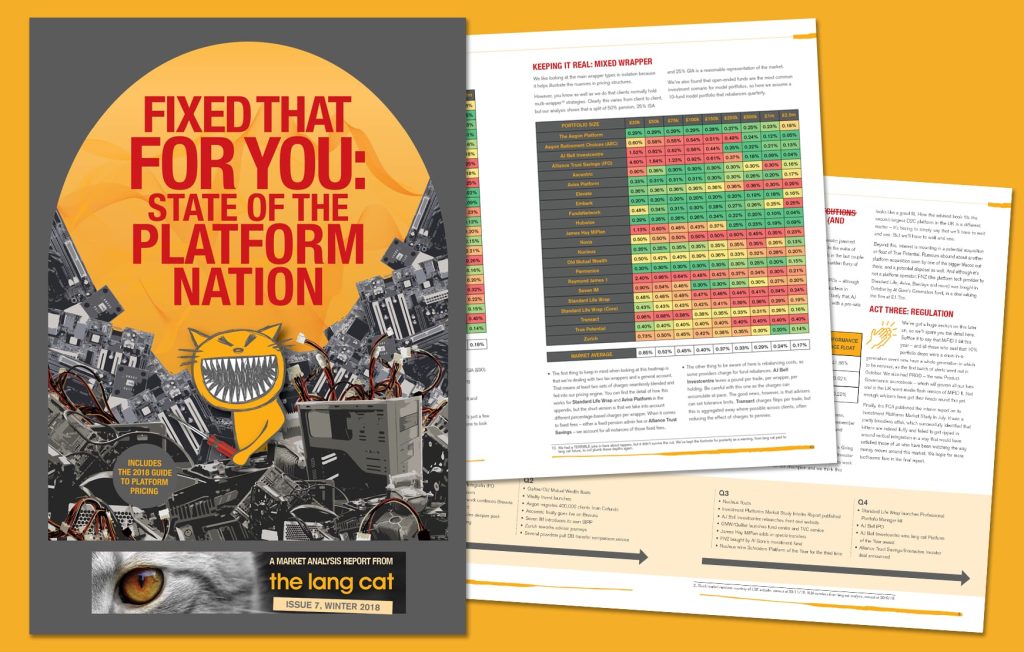NEW YEAR, NEW DISCLOSURE
Like a bad follow up album that no-one really wants, MIFID is back. 12 months ago we had the first wave of action, with transaction fees being exposed for all to see. Whereas these figures were expected costs, investors are about to start receiving statements showing the actual costs paid over the last 12 months, broken down in Imperial Credits of the Realm (£’s & pence), covering advice, platform, asset management, DFM and anyone else who is taking a slice of your investment returns.
We think this is potentially a big thing. For a long time, so called experts have speculated what might happen when investors are told the total cost of ownership. Whatever the answer to this is, we are about to find out. Some investors will be fine with it all. Their advisers have always been clear about costs, and these new statements won’t tell them anything they haven’t seen before. More importantly, these investors value the services they receive from their advisers.
However, if this isn’t the case, then it might be a wake-up call. If investors read these statements and don’t have a decent relationship with their adviser, then they might be prompted to take action. Especially since these statements are being sent out against the backdrop of some pretty choppy markets over the last 12 months.
As a result, we wanted to find out how this is all going to work, and especially what it all means for advisers and paraplanners. 15 platforms have very helpfully responded to our information request, and we are very grateful for the time they took to do so. If your favourite platform isn’t on the list, please ask them nicely if they could supply the information we need, and we’ll update the list accordingly. The research is available in a free handy document, which you can download by clicking the image below (takes you to our publications library where you can add the document to your shopping cart.
So what does it all mean? Here are our top 3 conclusions….
I have some sympathy for the platforms. This is a must do project, with a defined scope and timescale. Having run several of these projects myself I know just how complex they are, and how soul destroying it is to devote loads of time/energy/resource for “just” disclosure. Hate the system, not the player – this isn’t the platforms’ fault
However, for advisers who have client assets with a number of platforms (as the regulator likes you to do), it’s not going to be a great experience. Surprise surprise, everyone is doing things slightly differently, and your clients are going to get statements on different days, with different calculations and products
And as an adviser, for the majority of platforms you will have no involvement in the process. 100% of providers are sending these statements directly to clients themselves, and only a handful of platforms are giving advisers the ability to interrogate the data and/or run their own reports. Some of you will see this as a positive; others won’t. It will be interesting to hear how you feel about it all – let us know in the comments below
Our main conclusion is that advisers and paraplanners need to engage with this detail now. Whatever platform(s) you are using, your clients are about to get these statements landing on their doorstep. We hope this research helps you to plan accordingly.
THE TOP CLASS WEDNESDAY UPDATE NIVIR GANGS AGLEY

Indeed it does not, my trusty fieres, indeed it does not. And for those of you wondering what the hell he’s going on about in only the second Top Class Wednesday Update, we are of course celebrating the birthday of famed Scots filthmonger and purveyor of sentimental doggerel, Robert Burns. So on Friday, enjoy what […]
WELCOME TO THE INAUGURAL TOP CLASS WEDNESDAY UPDATE

HELLO, YOU So here’s the thing. You were all nice enough to sign up to hear from the lang cat at some point over the last few years, and when we offered you the chance to stop you chose not to. And what do we do? We don’t even send you so much as a […]
We’re not expensive! You’re expensive! Hargreaves updates its Wealth 50 buy list

As the style diary columns have it, ‘to the Ritz’ on Tuesday to hear about Hargreaves Lansdown’s new Wealth 50 discounted fund range. A typically restrained affair in a typically restrained venue, which obviously I didn’t enjoy as it contravenes my strong socialist credentials. I restored balance to the universe by eating not only my […]
the lang cat’s albums of 2018
This is definitely my last post of the year. Sound the trumpets and that. First, a clarification – there are 16 lang cats now and not all of them approve of this list. I say that in the full knowledge that none of them know what’s on it. Terry might like a few of these […]
Things can only get better, maybe – the lang cat’s round-up of 2018
Well, if you’re reading this, you made it. Only 8 hours or so to go and we can wave a fond-ish farewell to a very particular year. Usually in this end-of-year blog I spend time providing a devastatingly concise and insightful summary of the big stories of the year. And when I say ‘devastatingly concise […]
FIXED THAT FOR YOU: STATE OF THE PLATFORM NATION

We think that 2018 was the biggest year in platforms since RDR. It’s in that spirit, then, that we offer you FIXED THAT FOR YOU: STATE OF THE PLATFORM NATION – the lang cat’s 2018/19 guide to the advised platform market. [maxbutton id=”9″]
SJP ate my hamster
It’s time to make your voice heard
It’s nice to be listened to isn’t it? It’s even better when what you’re saying is being both listened to and shock horror… acted upon. Well, here’s a revelation for you; we love hearing what you’ve got to say about life in the financial services world. Whether it’s more Dismaland than Disneyland or you want […]
Robo Wars
It’s a tough job putting our annual guides together. For both our recently published Guide to Direct Platform Investing and our imminent(ish) guide to advised platforms, a lot of work goes into research, preparation and writing (no, really…). We then go through the editing/proofing/setting process, and eventually, if we don’t kill each other, the final version is released to the world. Without fail there will at that point be some sort of market event, product launch, repricing or some other change that is too late to include. And with our latest direct investing guide we have actually been treated to two.
Firstly, within a matter of hours of the files being sent to the printer, UBS closed its SmartWealth service to new business, proving yet again that nominative determinism doesn’t work in financial services. And that was quickly followed up by the news that a collection of robos (1) are planning on lobbying HM Treasury, the FCA and anyone else who might listen to relax the suitability rules for digital investing.
These two stories are not unconnected. UBS, like many others, found the direct investing market formidably difficult to break into. The market is utterly dominated by Hargreaves Lansdown, it has a market share of around 40% and is currently picking up new clients at a run rate of around 11,000 a month. There’s also a 95% client retention rate – they just don’t leave, no matter how shiny/cheap/cool the alternative is.
The UBS service was hilariously overpriced and only had a handful of customers, so no one will really miss it. However, it does serve to highlight just how hard it is to launch a D2C/robo business. Even big, deep-pocketed brands such as UBS are finding it impossible to make a dent into HL’s figures, and for the smaller start-ups the numbers are increasingly alarming.
Last month one of the start-up robos posted its latest accounts to Companies House. It doesn’t matter which one it was, because it could be one of many with a similar story. This firm is posting UK revenue well below £500k, with a cost base around £15m. Over £5m was spent on marketing during the period in question, and the overall loss was around £14m. It is, of course, perfectly normal for start-up businesses to experience losses in their early years, but the level of losses that the smaller robos are posting is insane and unsustainable.
Against this backdrop of tiny inflows, it comes as no surprise to read that a collection of robos (1) are seeking to get a reduction in the level of regulatory requirements for suitability. As a reminder, most of these services are Discretionary, so even if you are not offering advice (and some are) you still have a regulatory requirement to ensure suitability. This means that as well as the usual risk tolerance questions, you need to assess affordability.
If you are struggling to attract flows, the last thing you want to hear is that you have to turn away around 60% of potential customers because they fail the affordability checks, but that is exactly what is happening. And with household debt at record levels, that’s exactly what needs to happen. Anyone in this situation should be paying off their debt and saving before they even think about investing via a robo, and if anything the regulation should be more stringent in this respect.
This lobbying is a desperate commercial measure. When the only way you make money is by selling products, you clearly want to make it easy for folk to buy your stuff, but suitability must come first. These services are supposed to herald a new era for financial services, ‘democratising investing’, however by putting sales ahead of suitability it is clear where their priorities lie. It’s an old-skool product push, dressed up with a shiny app.
This collection of robos (1) would be better served by spending time and collective energy to show the benefits of investing, the value of advice and giving folk tools/services to gain control of their financial life. Debt management needs to be part of this, as is enabling a more holistic view of your finances beyond a bunch of ETFs. This isn’t beyond the wit of man, especially if the industry can create a consistent voice, however this would require a shift in mindset for most involved. If these firms are to avoid the fate of UBS they need to become genuinely customer centric, ensuring customers get the best possible outcome. Their current product-centric nature looks increasingly like their fatal weakness.
(1) insert your own collective noun joke here


